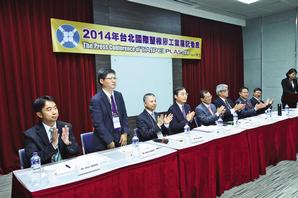By Steve Toloken
STAFF REPORTER / ASIA BUREAU CHIEF
Published: October 15, 2014 11:25 am ET
Updated: October 15, 2014 11:29 am ET

Image By: Taipei Plas
At Taipei Plas' opening news conference, executives said their research in all-electric manufacturing is making progress.
TAIPEI, TAIWAN — Taiwan’s large plastics machinery industry faces a challenge — less than 10 percent of its equipment uses the more eco-friendly all-electric technology favored by high-tech customers like the computer and medical industries.
But all-electric technology is where demand will come from. In the next decade, according to the head of Taiwan’s machinery industry trade group, more than 70 percent of smaller injection molding machines under 1,600 metric tons will be all-electric.
That’s forcing Taiwan’s industry to upgrade and try to overcome the bottleneck that’s limited its development, its reliance on more expensive Japanese and German suppliers for the key components of the all-electric machines.
At the recent Taipei Plas show, held Sept. 26-30 in Taipei, local companies unveiled new all-electric models and industry officials said it’s a key target.
David Wu, chairman of the Plastics and Rubber Machinery Committee at the Taiwan Association of Machinery Industry, said Taiwanese companies first introduced all-electric machines 20 years ago but abandoned them because their reliance on foreign technology made them unprofitable.
“The key components, including the servo motor and ball screw, we had to import them from Japan and Germany, so the cost was really high, which lowered down our competitiveness,” Wu said. “The margin for the all-electrics was lower than the hydraulics.”
Now, the Taiwanese firms are ready to try again. Several of them introduced new or improved versions of all-electric technology at the show, and Wu and other industry officials said joint research work between the industry and government is making progress.
Probably the most high-profile new entrant was a subsidiary of the giant Taiwanese contract manufacturer Foxconn Technology Group, using what it said was motor and controller technology developed by other units of the $131.8 billion company in the all-electric machines.
Foxconn’s Foxnum subsidiary unveiled its machines for sale at the Taipei show. It said it first started making them for internal Foxconn use in 2009 because it worried outside suppliers could not provide them quickly enough to meet demands in the fast-paced computer and smartphone industries.
Since Taiwan’s industry is heavily oriented toward electronics manufacturing, Foxconn’s concerns about available supply suggest there is market potential for Taiwanese firms, industry officials said. Foxconn has about 10,000 injection machines at its factories worldwide, the company said.
Speaking at the Sept. 26 opening news conference for the show, executives said their research is making progress in several areas, including the ball screw, linear guideways and servo motors and drivers.
Wu, for example, said Taiwanese firms can make the ball screws domestically, but for servo motors, the domestic technology is still somewhat limited.
“Taiwan is now ready to provide the key components of the ball screw,” said Wu, who is also general manager of press maker Multiplas Enginery Co. in Taoyuan, Taiwan. “However for the servo motor there are companies producing servo motors but with smaller horsepower, not for big machines.”
Some Taiwanese companies do make substantial use of all-electric technology. Sixty percent of blow molding machine maker Chumpower Machinery Corp.’s equipment is all-electric, said Bush Hsieh, managing director of the Taichung-based company.
“We import the driver and controller from Japan and Germany,” he said. “Our approach is by installing these very good quality drivers, the performance of our machines can really compete with the machines produced in Japan, Germany and other European countries.”
He said the company believes focusing on quality and precision processing can improve its profit margins, helping to offset reliance on imported components.
Still, he said his company believes having components like the drivers and controllers made in Taiwan will boost profitability.
“If we can acquire these key components domestically it will definitely increase our competitiveness, and also the quality of our products and our performance-cost ratio,” Hsieh said. “I do hope we can achieve that in a few years.”
Wu and others said Taiwanese companies at the moment are also focusing on hybrid machines as a transition to all-electrics, touting them as having better performance than traditional hydraulics without the cost of the all-electrics.
TAMI said Taiwan is the world’s fifth-largest plastics and rubber machinery maker, with sales of $1.51 billion last year, and the fourth-largest exporter, with sales of $1.26 billion. Both figures dropped about 6 percent in 2013, as China and the world markets slowed.
Wu predicted a modest turnaround this year, with export sales rising about 5 percent.
A lot of the industry’s focus is the mid-range markets, but Taiwanese firms are under increasing pressure from the technology of competitors in mainland China and other emerging markets, and are trying to upgrade to compete more directly with Japanese and other more advanced machines.
TAMI, for example, said that 80 percent of the injection molding machines made by the Japanese today are all-electric. Such technology is favored by precision manufacturing industries because the machines don’t use oil, making them cleaner, they have faster injection speeds and are more energy efficient, TAMI said.
“Currently Taiwan is striving hard in R&D and commercialization for fully electric molding machines,” TAMI President C.C. Wang said in a report analyzing Taiwan’s machinery industry position. “They have become the first choice for hi tech industries including computers, electronics, multi-media, communications and optics.”
Taiwan has a large plastics industry compared with its population of 23 million — it imported 1,480 injection molding machines in 2013, which is a little less than half the number of machines sold in the entire United States. About 57 percent of all injection molding machines are from Japan, TAMI said.
“Domestic manufacturers should look into this market and develop a new generation of fully electric injection molding machines that fully meet customer needs,” Wang wrote.
| 